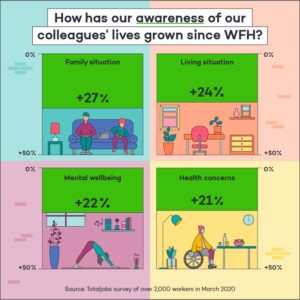
How managers can support the wellbeing of their teams following the Covid-19 outbreak
Table of Contents
- Workers worried about their health
- Colleagues are supporting each other
- Adapting to new ways of working
- Workers are thankful for their colleagues
- How managers can support their team
- Download the one pager featuring top tips on supporting the wellbeing of remote working teams
- Recruiter’s FAQ
Following the Covid-19 outbreak, two thirds of people in the UK are now working from home. This guide explains how managers and businesses can support the wellbeing of their teams, and foster an open and honest remote working environment.
Please be advised that while much of the advice contained within this article is still relevant to recruitment, some of the insights may no longer be applicable. Visit the Hiring Trends Index for our most recent outlook on the jobs market, or explore our latest recruitment advice here.
Two thirds (64%) of us are currently working from home as we adjust to working life following the Covid-19 outbreak, according to Totaljobs research.1 Alongside this, the way we’re communicating with our colleagues is changing, with teams reporting more empathy and more openness with each other. This means that despite the worry and uncertainty many of us are feeling in response to Covid-19, workers across the UK are finding themselves closer together, despite the distance.
Workers worried about their health following Covid-19 outbreak
Understandably, 87% of UK workers are currently worried about their health. Close behind this is concern over job security (67%), which points to the uncertainty in the wider UK market. These worries are also impacting our sleep, with half of workers saying they’re struggling to get shut eye, and the same amount reporting being less active as a result of the UK-wide lockdown. While social distancing is essential at the moment, over half (55%) of workers are feeling lonely while working from home.
Colleagues are supporting each other
It’s not just our own circumstances we’re thinking about. We’re thinking more about our colleagues, with 86% of UK workers saying they’re worried about the people they work with. As a result, 81% are making extra effort to reach out to their colleagues. With more workers consciously checking in on their colleagues and 44% wanting to show their support in recognition of this challenging time, people are getting creative when it comes to putting a smile on someone’s face:
- 31% are sharing notes, memes or links
- 28% are chatting outside of work hours
- 19% are taking digital breaks together
- 15% are organising online games or challenges, including virtual bingo, or making playlists
- 15% are taking part in online classes or happy hours
Adapting to new ways of working
The UK workforce has risen to the challenge of adapting to new ways of living and working in response to the Covid-19 outbreak. However, workers are open about some of the things they’re missing in their new working life:
- Workplace banter and gossip: 44%
- Having people around: 42%
- Seeing colleagues face-to-face: 40%
- Workplace dynamics: 29%
- Sharing coffee or lunch breaks: 26%
Just as the new remote way of working has seen us learn more about our colleagues’ home set ups, it means people are also being more vocal about what’s on their mind. Overall, teams are sharing more about their own health, their loved ones, and also feel more comfortable talking through their worries with colleagues, whether related to work or personal life.
 For many, this digital camaraderie means that 70% of workers say that working from home has changed their perception of their colleagues. This ranges from having more empathy and respect for a colleague, to having a stronger sense of friendship, or simply a better level of awareness of the personal circumstances of others.
For many, this digital camaraderie means that 70% of workers say that working from home has changed their perception of their colleagues. This ranges from having more empathy and respect for a colleague, to having a stronger sense of friendship, or simply a better level of awareness of the personal circumstances of others.
Workers are thankful for their colleagues
On the whole, UK workers are also voicing their gratitude for the people they work with. Likely a result of more honesty and talking about subjects outside of work, 77% of people are grateful for the support of their colleagues, and 71% say they feel supported in the current situation. This optimism has a knock-on effect, with 82% of workers feeling able to cope with the current Covid-19 situation. No doubt this is in part due to the help of the people they work with.
How managers can support their team’s emotional wellbeing
Many managers might find themselves testing out new ways of engaging with and supporting their team through this unprecedented time.
Book in regular check ins
Communication is even more important now, while we’re unable to quickly catch up with someone at their desk. Managers can look to book in regular individual check ins with team members, to get an idea of how they’re finding working from home or how they can be further supported. 38% of UK workers surveyed by Totaljobs say their manager is already doing this.
Introduce structure
Half (51%) of workers note that they’re feeling distracted, which is no surprise. Encourage teams to block out time in their calendars when working on larger projects, and empower them to be open about when they might need to turn notifications on team channels to get focused. In general, we’re also finding ourselves checking our phones more, as a result of frequent news updates on the current situation. By encouraging teams to check in on phones during their breaks, rather than throughout the day, they’re less likely to feel distracted by factors outside of work.
Maintain team morale
A third of UK workers say they have daily team catch ups while working remotely, while 31% have scheduled breaks with their team. Working from home can mean that working through lunchtime or not moving from a laptop for hours becomes more likely, as colleagues aren’t there to remind each other when they might need a break. As a manager, be vocal about when you’re taking breaks or taking lunch, and remind your team to take time away from their laptops. Setting up a dedicated work channel for team chats can also help with these kinds of reminders, plus acts as a boost for team morale – 31% of workers report being part of a work social channel with their team. Along with this, organising virtual socials will mean that teams can wind down at the end of the week, and they don’t lose the social aspect of the workplace. 17% of UK workers have seen digital socials organised by their manager or employer – from online pub quizzes to a drink over video call.
Transparency is key
With some workers understandably concerned about job security, regular business updates are important to put minds at ease and keep employees up to speed in this changing situation. Consider your internal communication channels at this time, and organise opportunities for virtual Q&A sessions so employees can voice anything they might want clarity on.
Celebrate and reward great work
Many UK businesses have changed processes, or even altered the products they create, to meet the needs of the UK. For the teams making this happen, celebrating their success and highlighting their efforts is essential, not only for personal development, but to bring people across the business together.
Totaljobs survey of 2,008 UK workers conducted from Tuesday 24 March to Friday 27 March 2020.
Recruiter’s FAQ
What are the main challenges UK workers face when working from home after the Covid-19 outbreak?
Common challenges include feelings of loneliness (55%), missing in-person interactions like workplace banter (44%), and difficulty staying active. Many workers also report distractions, reduced sleep quality, and increased concerns over health and job security.
How can managers best support their team’s wellbeing while working remotely?
maintain team morale through virtual socials, and keep communication transparent with regular business updates. Celebrating achievements and recognising contributions also helps keep teams motivated and connected.
How has remote working affected relationships between colleagues?
maintain team morale through virtual socials, and keep communication transparent with regular business updates. Celebrating achievements and recognising contributions also helps keep teams motivated and connected.
Receive the latest recruitment resources and
advice to boost your hiring
By providing us with your details you agree to our privacy policy and for us to keep you updated with the latest news, events,
and special offers from Totaljobs.






